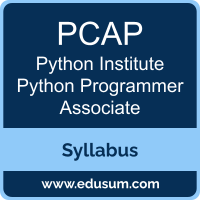 Use this quick start guide to collect all the information about Python Institute Python Programmer Associate (PCAP) Certification exam. This study guide provides a list of objectives and resources that will help you prepare for items on the PCAP Python Institute Certified Associate in Python Programmer exam. The Sample Questions will help you identify the type and difficulty level of the questions and the Practice Exams will make you familiar with the format and environment of an exam. You should refer this guide carefully before attempting your actual Python Institute PCAP-31-03 certification exam.
Use this quick start guide to collect all the information about Python Institute Python Programmer Associate (PCAP) Certification exam. This study guide provides a list of objectives and resources that will help you prepare for items on the PCAP Python Institute Certified Associate in Python Programmer exam. The Sample Questions will help you identify the type and difficulty level of the questions and the Practice Exams will make you familiar with the format and environment of an exam. You should refer this guide carefully before attempting your actual Python Institute PCAP-31-03 certification exam.
The Python Institute Python Programmer Associate certification is mainly targeted to those candidates who want to build their career in Associate Programmer domain. The Python Institute Certified Associate in Python Programmer (PCAP) exam verifies that the candidate possesses the fundamental knowledge and proven skills in the area of Python Institute PCAP-31-03.
Python Institute Python Programmer Associate Exam Summary:
| Exam Name | Python Institute Certified Associate in Python Programmer (PCAP) |
| Exam Code | PCAP |
| Exam Price | $295 (USD) |
| Duration | 65 mins |
| Number of Questions | 40 |
| Passing Score | 70% |
| Books / Training |
Python Essentials 2 PCAP Programming Essentials in Python |
| Schedule Exam | Pearson VUE |
| Sample Questions | Python Institute Python Programmer Associate Sample Questions |
| Practice Exam | Python Institute PCAP Certification Practice Exam |
Python Institute PCAP Exam Syllabus Topics:
| Topic | Details | Weights |
|---|---|---|
| Modules and Packages |
- Import and use modules and packages
- Perform evaluations using the math module
- Generate random values using the random module
- Discover host platform properties using the platform module
- Create and use user-defined modules and packages
|
12% |
| Exceptions |
- Handle errors using Python-defined exceptions
- Extend the Python exceptions hierarchy with self-defined exceptions
|
14% |
| Strings |
- Understand machine representation of characters
- Operate on strings
- Employ built-in string methods
|
18% |
| Object-Oriented Programming |
- Understand the Object-Oriented approach
- Employ class and object properties
- Equip a class with methods
- Discover the class structure
- Build a class hierarchy using inheritance
- Construct and initialize objects
|
34% |
| Miscellaneous (Scope: List Comprehensions, Lambdas, Closures, and I/O Operations) |
- Build complex lists using list comprehension
- Embed lambda functions into the code
- Define and use closures
- Understand basic Input/Output terminology
- Perform Input/Output operations
|
22% |
To ensure success in Python Institute PCAP-31-03 certification exam, we recommend authorized training course, practice test and hands-on experience to prepare for Python Institute Certified Associate in Python Programmer (PCAP) exam.
